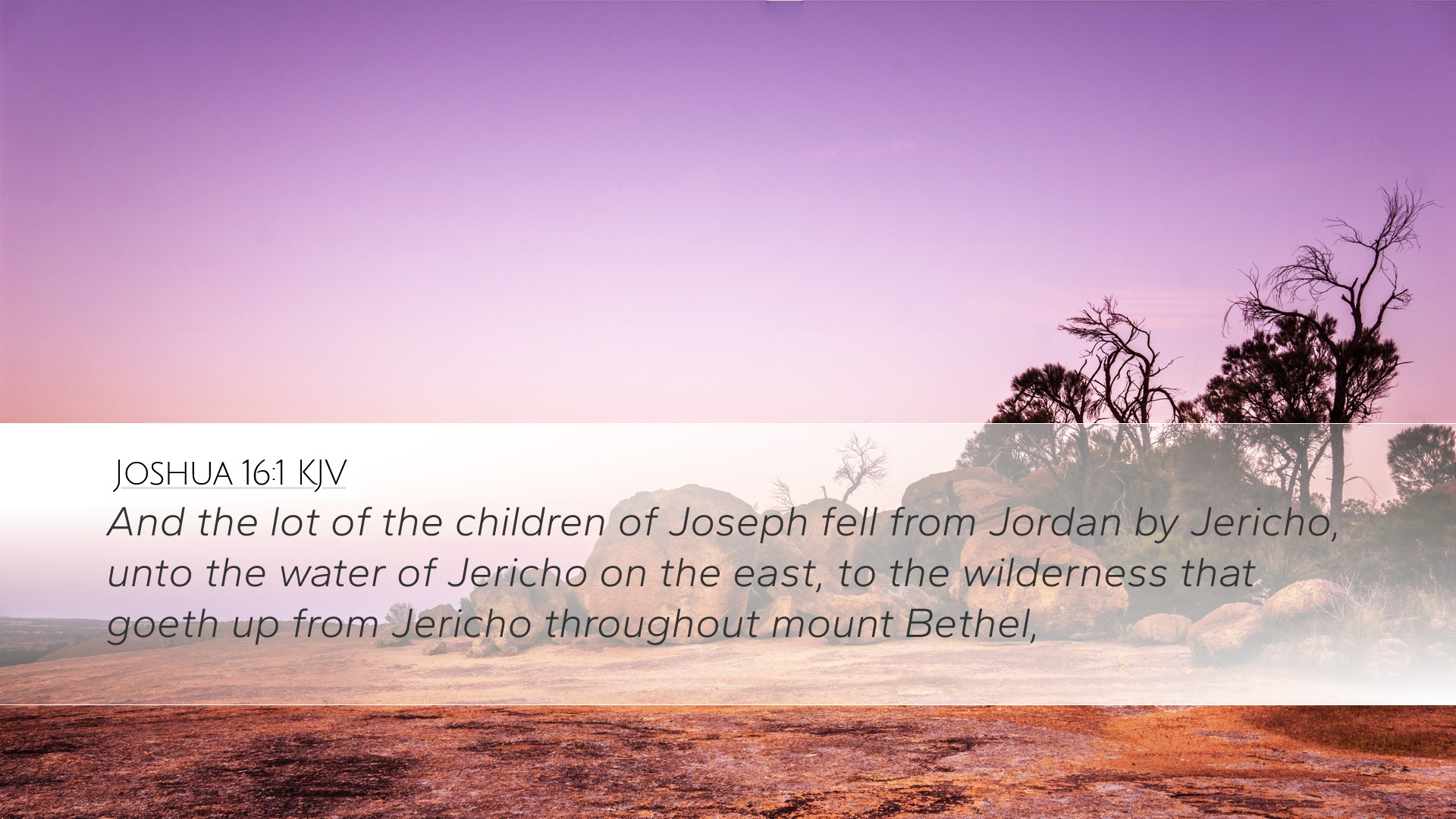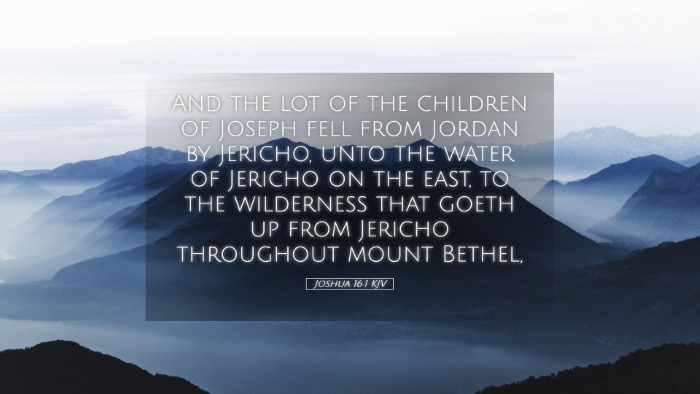Old Testament
Genesis Exodus Leviticus Numbers Deuteronomy Joshua Judges Ruth 1 Samuel 2 Samuel 1 Kings 2 Kings 1 Chronicles 2 Chronicles Ezra Nehemiah Esther Job Psalms Proverbs Ecclesiastes Song of Solomon Isaiah Jeremiah Lamentations Ezekiel Daniel Hosea Joel Amos Obadiah Jonah Micah Nahum Habakkuk Zephaniah Haggai Zechariah MalachiJoshua 16:1
Joshua 16:1 KJV
And the lot of the children of Joseph fell from Jordan by Jericho, unto the water of Jericho on the east, to the wilderness that goeth up from Jericho throughout mount Bethel,
Joshua 16:1 Bible Commentary
Commentary on Joshua 16:1
Verse Text: “The lot of the children of Joseph fell from Jordan by Jericho, unto the water of Jericho on the east, to the wilderness that goeth up from Jericho throughout mount Bethel.”
Introduction
The Book of Joshua narrates Israel's conquest and distribution of the Promised Land under Joshua's leadership. Chapter 16 specifically addresses the inheritance assigned to the descendants of Joseph, which comprises the tribes of Ephraim and Manasseh. This commentary delves into the implications of their inheritance as depicted in Joshua 16:1, synthesizing insights from esteemed public domain commentators.
Overview of the Context
The chapter sets the stage for understanding God’s providence in guiding the Israelites to their territorial inheritance, emphasizing the significance of land allocation to the tribes of Joseph. The verse captures the geographical boundaries that delimit the land inheritance for Joseph's descendants, offering a sense of place and identity amidst the broader narrative of Israel's settlement.
Insights from Matthew Henry
Matthew Henry asserts the importance of the lot as God’s sovereign choice in determining the inheritance of the tribes. He notes:
- The designation of land is a reflection of God’s promise to Abraham, Isaac, and Jacob, fulfilled in the establishment of Israel.
- Henry reflects on how the territory assigned to Joseph signifies their strength as the leading tribes, marked by both prominence and responsibility.
- He emphasizes the strategic location of Ephraim, which was central for trade and military movements, showcasing God’s wisdom in their allocation.
Insights from Albert Barnes
Albert Barnes explores the implications of Joseph's lot, suggesting that:
- The phrase “from Jordan by Jericho” indicates a well-defined boundary crucial for understanding the geopolitical landscape of the time.
- Barnes points out the reality of human conflict over boundaries, which later plays a significant role in the history of Israel, emphasizing the pastoral relevance of peace and resolution in managing disputes.
- He stresses the rich agricultural potential of the land, reflecting on God’s provision for His people as they settled in abundance.
Insights from Adam Clarke
Adam Clarke provides a deeper analysis of the name “Joseph,” connecting it to themes of growth and blessing. According to Clarke:
- The name signifies those who are adding to their numbers – a point that serves as a reminder for modern believers about the importance of spiritual multiplication.
- Clarke underscores the topographical details of the inheritance, such as its boundaries along the Jordan and Jericho, framing it within a historical context that is essential for theological reflection.
- He connects Joseph's inheritance with the legacy of favor and struggle, suggesting that even in abundance, trials remain a part of the faithful journey.
Theological Significance
This verse encapsulates rich theological themes that are relevant across time and circumstance:
- Divine Providence: The assigned lot represents God's control over history and circumstances, highlighting that He directs the affairs of His people.
- Identity and Heritage: The inheritance serves as a tangible representation of God's faithfulness to Israel, instilling a sense of identity in the tribes, which remains significant for Christians today as they identify with the promises of God.
- Faith and Conflict: The assignment of land to Joseph foreshadows the conflicts that would arise, reminding believers of the ongoing struggles in faith and community.
Application for Today's Believers
As this commentary reaches pastors, students, and theologians, several applications emerge:
- Grounded in Promise: Just as the Israelites were rooted in the promises of God, modern believers are called to anchor their identity in God’s covenantal faithfulness.
- Embracing Responsibility: With blessings come responsibilities, akin to how the tribes of Joseph were expected to steward their land while facing potential conflicts.
- Seeking Peace: Learning from the historical reality of boundary disputes, current congregations are encouraged to pursue peace and resolve conflicts rooted in gospel unity.
Conclusion
The inheritance of Joseph, marked in Joshua 16:1, is a profound reminder of God's sovereign provision and the covenantal heritage passed through generations. As we reflect upon these theological insights, we are invited to appreciate our own inheritance in Christ, marked by grace, responsibility, and the call to embody the gospel in our contemporary contexts.


